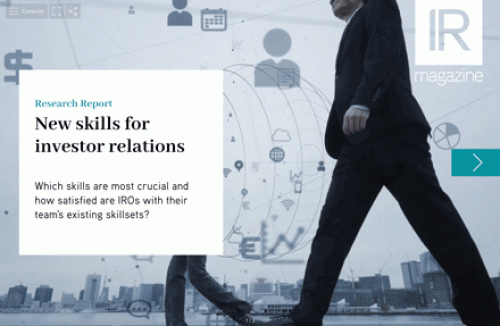Stefano De Caterina works as an IR manager at AMG Critical Materials, an international Euronext-listed critical materials company. He started his IR career in 2016, working at publicly listed Dutch firm Ahold Delhaize, before moving to Aegon where he deepened his IR skills, specifically in the financial sector.
More recently, De Caterina worked as an IR consultant for companies across the UAE and Saudi Arabia, including Arabian Drilling, the country’s largest drilling contractor, where he supported the creation of the IR function.
Here, he offers his view on the differences between IR in the Middle East and IR in Europe, including contrasts in challenges and opportunities, recognition of the function and diverging investor expectations of IR practitioners across the two regions.

Given your experience in both Europe and the Middle East, what key differences have you observed in how IR is managed in these regions?
In the Middle East, IR is still developing but progressing rapidly toward international best practice. The influence of the Middle East Investor Relations Association (MEIRA) is particularly significant in the region, as it actively promotes global standards across the Gulf Cooperation Council (GCC) zone, providing essential training and resources that help elevate the quality of IR.
Despite the progress, a gap remains – particularly in discretionary disclosure and proactive communication, where companies often hesitate to go beyond minimum requirements. This contrasts with Europe, where companies are generally more transparent, understanding that greater disclosure can reduce market risk perception and improve capital efficiency.
In the GCC, IR professionals often face the additional challenge of educating management on the strategic value of disclosure and proactive investor communication, which is a given in Europe. While both regions are moving toward data-driven and technology-enhanced IR strategies, the Middle East still has some ground to cover, particularly in embedding ESG considerations fully into the IR function, which is more mature in European markets.
What are some of the challenges IR professionals face in both Europe and the Middle East?
In the Middle East, one of the main challenges is the need to educate management about the importance of IR and the value of transparency. This is often a key part of the role, as management teams may not fully grasp how proactive communication and disclosure can enhance a company’s market perception and shareholder value. In Europe, where IR is more established, professionals focus more on fine-tuning their engagement strategies than on justifying their existence.
Additionally, IR professionals in the Middle East must often deal with a regulatory environment that is still catching up with international standards, particularly around ESG reporting, which is still seen more as an add-on than an integral part of IR strategy.
In terms of regulatory challenges, particularly in terms of ESG, how do the regions compare?
ESG reporting in the GCC is still in its early stages compared with Europe, where it has become a critical part of corporate strategy and investor engagement. In the GCC, ESG is often treated as a separate, discretionary disclosure rather than a core component of the IR function. This reflects a broader need for companies in the region to integrate ESG more fully into their overall narrative, aligning with the expectations of international investors.
But MEIRA and other regional bodies are making strides in promoting better ESG practices, which will be crucial as global investors increasingly focus on sustainability.
How do investor perceptions and expectations differ between these two regions?
Investor expectations in the GCC often center on strong dividend yields, reflecting the preference of many regional investors for immediate returns. By contrast, European investors typically focus more on long-term value creation, governance and sustainability metrics. This difference in investor focus shapes how companies engage with their investor base in each region.
How does investor engagement differ across the two regions?
While the core principles of investor engagement are similar, the focus of discussions can vary. In Europe, engagement often revolves around deeper strategic conversations, ESG considerations and long-term value. In the Middle East, the emphasis tends to be more on financial performance and dividends, reflecting prevailing investor priorities.
Can you share some successful IR strategies that work well in the Middle East but might not be as effective in Europe – and vice versa?
A successful strategy that works well in both regions is a data-driven approach, starting with market perception studies to gauge investor sentiment and tailor the IR strategy accordingly. In the Middle East, building trust through consistent communication and education about the strategic role of IR is particularly effective. In Europe, integrating sustainability into the investor narrative is often more impactful.
What trends do you foresee for the future of investor relations in Europe and the Middle East?
AI and technology will play a transformative role in the future of IR, enhancing data analysis, market sentiment tracking and overall engagement efficiency. The adoption of digital tools in IR is expected to grow in both regions, although Europe may see faster adoption due to its more established market structures. For the Middle East, the continued professionalization of IR, driven by MEIRA and the influx of international expertise, will help close the gap with western practices.
If you could offer one piece of advice to IR practitioners in the Middle East and another to those in the Netherlands, what would it be?
For IR professionals in the Middle East, my advice would be to champion international best practices and continually educate management on the value strategic IR brings to the company and its shareholders. For Dutch IR practitioners, I would encourage seeking international opportunities to broaden your perspective and deepen your expertise, as exposure to different markets will strengthen your skills and enhance your IR capabilities.










